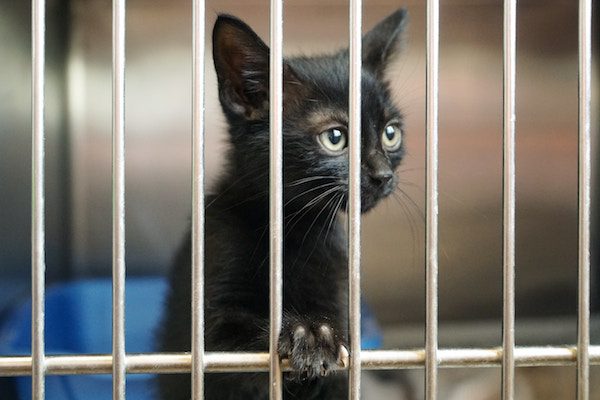


Care2: In four U.S. states, animal shelters have a special way to dispose of unwanted pets. They cram the animals into gas chambers, where they spend their last moments slowly asphyxiating to death. The process is terrifying, filled with panic and can take 30 minutes or even longer. This inhumane practice is almost universally condemned by animal welfare experts, who agree that the only appropriate option is euthanasia by injection. This alternative, while still extremely upsetting and tragic, is at least fast and minimally traumatic when performed by someone who has received humane euthanasia training. But in the states of Utah, Missouri, Ohio and Wyoming, that final kindness is not guaranteed for any shelter animal. Twenty-eight U.S. states have already banned the use of gas chambers in animal shelters. That’s not enough.
>>>Tell Congress to make sure every animal is provided with a humane, dignified death by banning the use of asphyxiant gases to kill shelter animals.
Shark Stewards: Shark finning is the unsustainable and inhumane practice of cutting off a shark’s fins, often while the shark is still alive, and discarding the body into the ocean. The fins are used in shark fin soup and other dishes. Once an expensive dish limited to the nobility, shark fin soup is now widely sold to millions of consumers. As economies grow in Asia, a dish once reserved for the elite is now available to the middle class, and is in huge demand among many communities in China and around the world, including across the United States. Although shark finning is illegal in the U.S., the sale and trade of fins is still allowed in most states and shark fins are imported and re-exported, contributing to shark finning and other illegal, unreported and unregulated fishing of sharks. The shark fin trade is increasing shark catch, placing more pressure on threatened species and driving overfishing of many shark species.
>>>Urge Congress to pass HR 737 The Shark Fin Sales Elimination Act of 2019.
Rainforest Rescue: The Caribbean: the name conjures up images of pristine white beaches, deep blue water and breathtaking coral reefs. Yet a local government seems oblivious to the ecological treasure just off its coast: The Cayman Islands want to ramp up mass tourism by building a new port for mega cruise ships—on top of a reef. The project would destroy twelve hectares of coral and other seabed forever. The sand and other solids disturbed by the dredging work would turn crystal-clear waters into an opaque soup, choking stationary underwater life forms as the sediment settles on them. The coral reef that has grown and thrived for centuries as a highly biodiverse ecosystem would be replaced by concrete.
>>>Urge the Cayman Islands government to protect the Caribbean marine environment from the cruise industry.
Cause for concern…

- Ghost forests are sprouting up along the Atlantic Coast (Ula Chrobak, Popular Science)
- Europe’s food waste is ‘a scandal,’ says agency chief (Thin Lei Win, Thomson Reuters)
- Saving the planet with electric cars means strangling a Chilean desert (Laura Millan Lombrana, Bloomberg)
- Shift to renewable energy could have biodiversity cost, researchers caution (Ashley Stumvoll, Mongabay)
- Forest Service wants to fast-track logging without environmental review (Jordan Davidson, EcoWatch)
- Dairy farmer of 18 years says cows are devastated when their calves are stolen (Free From Harm)
Round of applause…

- Your essential guide to disaster preparedness for pets (Kimberly Alt, Canine Journal)
- New lawsuit seeks to hold the Trump administration accountable for eliminating environmental grades (Alexandra Jacobo, Nation of Change)
- Plant-based meat sales set to explode, could grow 1,000% over next 10 years, reaching $140 billion (Kate Taylor, Business Insider)
- More than one-third of all food is wasted—here are 11 ways to reduce food waste and save money (Matt Petronzio, Mashable)
- How planting prairie strips on farms can save soil, water, wildlife and money (Paul Brennan, Little Village Magazine)
- VIDEO: This pigeon gets so excited when her mom comes home from work (@dodo)
Parting thought…
“There are people in the world so hungry, that God cannot appear to them except in the form of bread.” —Mahatma Gandhi